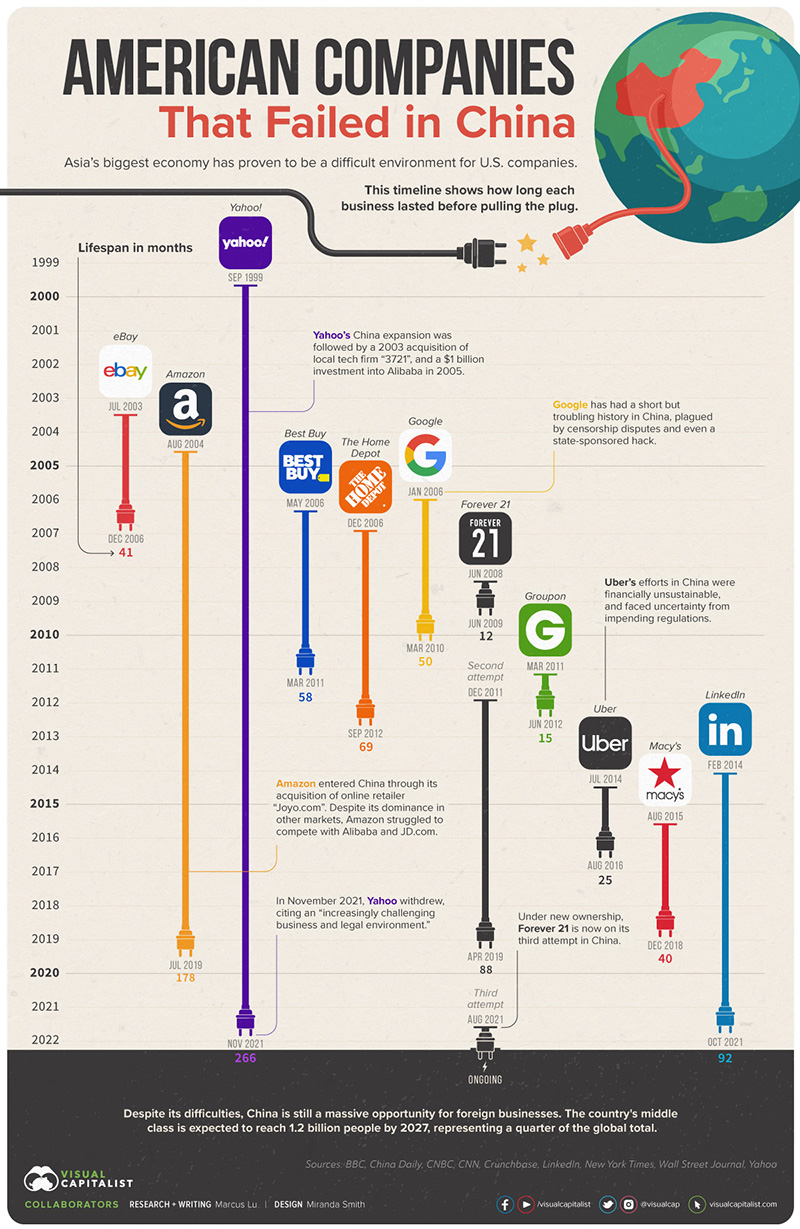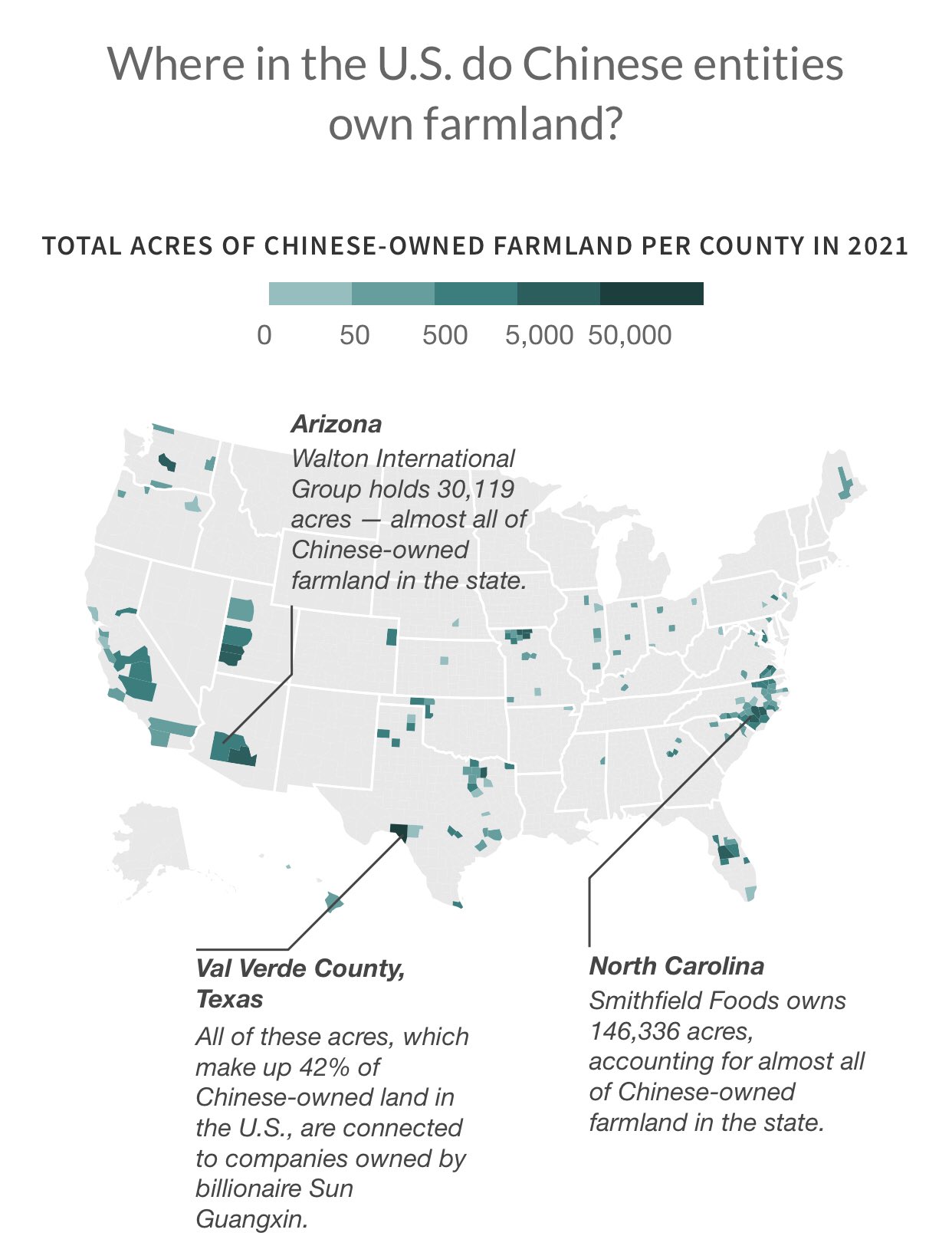AMC Theatres and Legendary Entertainment are two prominent US companies owned by Chinese conglomerate Dalian Wanda Group. Smithfield Foods, the world’s largest pork producer, is owned by WH Group of China.
Understanding the landscape of American businesses with Chinese ownership illuminates the complex tapestry of global economics. This ownership reflects the strategic moves by Chinese firms to diversify and gain international market share. Such acquisitions often result in a blend of cultures, business practices, and economic influence, fostering discussions on investment trends, national security, and economic sovereignty.
As these companies operate on American soil, they bring with them a fusion of expertise and international perspectives that contribute to the dynamic nature of the US corporate sector.
The Rise Of Chinese Investments In The Usa
Chinese investments in the United States have grown rapidly in recent years. This trend reflects a strategic push by Chinese companies to gain a foothold in one of the world’s largest markets. The investments cover a broad range of industries, from tech to agriculture. Understanding the motivations and historical context is essential to grasp the impact of these acquisitions.
Motivations Behind Chinese Acquisitions
Several factors drive Chinese companies to invest in American businesses. These motivations include:
- Access to advanced technology and intellectual property.
- Expansion into new markets for growth opportunities.
- Acquisition of brand recognition and customer bases.
- Seeking strategic assets to boost competitiveness.
Historical Perspective On Foreign Ownership
Foreign ownership in the USA is not a new phenomenon. The country has a long history of attracting overseas investors. Here’s a brief look at the evolution:
| Period | Key Events |
|---|---|
| 19th Century | European investment in railways and industry |
| Mid-20th Century | Growth of multinational corporations |
| Late 20th Century | Japanese investment in real estate and tech |
| 21st Century | Chinese investments in various sectors |
The landscape has evolved, with China becoming a significant player in the current era. These investments continue to shape the economic and political discourse in the USA.

Credit: www.lunarmobiscuit.com
Major Sectors Targeted By Chinese Investors
Chinese investors are focusing on key sectors in the USA. They are investing in areas that impact everyday life and future technologies.
Real Estate And Hospitality
Chinese investment in the real estate and hospitality sector is significant. They own major hotels and commercial buildings. This includes high-profile properties in big cities. These investments help them gain a steady income from rents and increase their influence in local markets.
Technology And Innovation
The technology and innovation sector has seen substantial Chinese investment. They own parts of tech firms that work on everything from mobile apps to advanced computing. This gives them access to new ideas and developments.
- Software companies
- Artificial intelligence startups
- Semiconductor firms
Automotive Industry
Chinese companies own stakes in several US automotive firms. They focus on electric vehicles and battery technologies. This sector is important for the future of transport.
| Company | Investment Type |
|---|---|
| Electric Car Startups | Majority Stakes |
| Battery Developers | Technology Sharing Agreements |
Entertainment And Media
Chinese investment in entertainment and media shapes global culture. They own movie studios and have stakes in music production companies. This helps them spread Chinese culture worldwide.
- Movie Production Companies
- Music Labels
- Streaming Services
High-profile Usa Companies With Chinese Stakeholders
High-Profile USA Companies with Chinese Stakeholders are a testament to the global economy’s interconnectedness. Chinese investors have made significant inroads into American businesses, bringing new dynamics to the marketplace. This section highlights key industries where Chinese influence is evident, revealing the depth of their involvement in the US corporate landscape.
Tech Giants In Chinese Hands
The tech world sees a remarkable blend of East meets West. Giants like IBM’s PC division, now under Lenovo, and Smartphone maker Motorola, acquired by Lenovo as well, showcase China’s strategic tech foothold. Even Snapchat has Chinese fingerprints, with Tencent holding a significant stake. This cross-pollination brings diverse tech advancements to the forefront.
Chinese Presence In Hollywood
The sparkle of Hollywood has not escaped Chinese investors. AMC Theatres, a staple in American cinema, became a subsidiary of China’s Dalian Wanda Group. Legendary Entertainment, the studio behind blockbusters like ‘Jurassic World’, also joined the Wanda family. These moves signify China’s growing influence in global entertainment.
Chinese Acquisitions In The Automotive Sector
The automotive industry witnesses a blend of American innovation and Chinese investment. Volvo, once a Swedish brand with a strong US presence, was taken over by Geely Holding Group. Even Tesla saw a boost with Tencent acquiring a 5% stake, fueling its electric dreams. These partnerships drive the industry towards a future of collaboration.
Economic Impacts Of Chinese Ownership
China’s investment in U.S. companies can shake things up. It brings money, jobs, and change. We need to look close at how this affects us all. It’s not just about who owns what. It’s about jobs, towns, and the world’s buying and selling rules. Let’s dig into the real effects of Chinese ownership in the USA.
Job Creation Vs. Job Loss
Chinese investments can mean new jobs. They build factories, stores, and offices. This is good news for job seekers. But not all see it that way. Some worry American jobs might go to China. Or that U.S. workers might lose out. We have to balance things out. We need to make sure jobs stay here and grow.
Impact On Local Economies
- Money Flow: When a Chinese company sets up shop, money flows in. This can help a small town grow fast.
- More Services: New businesses need things. Like food, cleaning, and repair. This can start more local businesses.
- Property Values: As places grow, homes and shops can be worth more. This can be good for owners.
Still, not all places feel the good stuff. Some might miss out or face trouble. We need to help these places too.
Influence On Global Trade Practices
China owning U.S. companies can change trade rules. They can push for ways that help them most. This might make trade fairer or not. It can lead to big talks between countries. These talks decide how we all buy and sell across the world. It’s a big deal that needs careful watching.
Security And Privacy Concerns
When U.S. companies are owned by Chinese entities, questions arise. Are our data and national interests safe? Let’s explore the risks and responses tied to these ownerships.
Data Security Risks
Personal information could be at risk. Chinese ownership might lead to data breaches. This worries many people.
- User data may transfer overseas.
- There’s a chance of unauthorized access.
- Companies must protect sensitive data.
National Security Implications
Ownership by China stirs national security concerns. Critical infrastructure could be compromised. The U.S. government keeps an eye on this.
| Area | Risk Level |
|---|---|
| Telecommunications | High |
| Technology | Medium |
| Manufacturing | Low |
Regulatory Responses To Security Threats
The U.S. takes steps to protect its interests. Laws and regulations aim to mitigate risks.
- Review of foreign investments by CFIUS.
- Trade restrictions can limit technology transfer.
- Implementation of cybersecurity measures is essential.

Credit: www.youtube.com
The Political Dimension
The Political Dimension of Chinese ownership of U.S. companies cannot be understated. It intertwines with diplomatic ties, legal frameworks, and public opinion. This intricate relationship influences economic strategies and national policies. Understanding this dimension sheds light on the complexities of global commerce and geopolitics.
Bilateral Relations Between The Us And China
The relationship between the U.S. and China is a tapestry of cooperation and competition. This dynamic is pivotal in shaping the business landscape. It affects the flow of investments and ownership across borders. Both nations navigate a delicate balance to foster growth while safeguarding their interests.
Legislation Affecting Foreign Ownership
In recent years, the U.S. has scrutinized foreign investments more closely. New laws aim to protect critical technology and infrastructure. They also address concerns about national security. These regulations impact Chinese companies’ ability to acquire or maintain ownership in American enterprises.
Public Perception And Sentiment
Public sentiment plays a significant role in the dialogue about ownership. Media reports and political rhetoric can sway opinions. This influences consumer behavior and can lead to calls for policy changes. The public’s view on Chinese ownership of U.S. companies remains a critical factor in this multifaceted issue.
Case Studies: Successes And Failures
The landscape of global business sees frequent cross-border acquisitions. Chinese investment in American companies presents a complex tapestry of successes and failures. This section explores case studies of Chinese ownership within US firms. We delve into instances of seamless integration and examine the challenges leading to divestments. The insights from these cases serve as valuable lessons for future cross-border acquisitions.
Successful Integrations Of Chinese-owned Firms
Several US companies under Chinese ownership have thrived. They showcase how strategic partnerships can lead to mutual growth.
- AMC Theatres: Acquired by Dalian Wanda Group, AMC has grown significantly, illustrating a successful integration.
- Smithfield Foods: Owned by WH Group, it remains a leading pork producer, maintaining its brand reputation post-acquisition.
- Legendary Entertainment: Wanda’s acquisition led to box office hits, benefiting from increased capital.
Failures And Divestments
Not all Chinese acquisitions of US firms have been successful. Some have led to divestments due to various challenges.
- Motorola Mobility: Lenovo’s acquisition faced integration issues, leading to financial losses.
- Terex Corporation: Zoomlion’s failed bid for Terex marked a high-profile divestment, thwarted by financial and regulatory hurdles.
Lessons Learned From Cross-border Acquisitions
These case studies offer insights into the complexities of international business deals.
- Understanding the target company’s culture is crucial for a smooth transition.
- Regulatory compliance is a significant factor in the success of acquisitions.
- Long-term strategic alignment ensures the sustainability of the acquisition.

Credit: twitter.com
The Future Landscape
The landscape of Chinese ownership in American companies is ever-changing. With economic growth and global policies evolving, the pattern of investments is shifting. Understanding these changes is crucial for businesses and investors alike.
Predicting Trends In Chinese Investments
Identifying patterns in Chinese acquisitions can offer insights into future investments.
- Technology and innovation continue to attract interest from Chinese investors.
- Real estate and infrastructure projects remain steady in receiving funds.
- Chinese firms are expanding their reach into entertainment and consumer goods.
Evolving Policies And Regulations
New policies may reshape the investment landscape.
- Trade agreements could open doors for more Chinese ownership in certain sectors.
- Regulatory scrutiny on foreign investments will likely increase, impacting deal flow.
- Intellectual property rights and data security are becoming key focus areas for regulators.
Strategies For American Companies And Investors
Adaptation is essential for success in this dynamic environment.
| Strategy | Description |
|---|---|
| Due Diligence | Conduct thorough research on potential Chinese partners. |
| Compliance | Ensure all deals align with current regulations. |
| Market Understanding | Stay informed on China’s market conditions and policies. |
Frequently Asked Questions
How Many Us Companies Are Now Owned By China?
Determining the exact number of U. S. companies owned by China is challenging due to varying definitions of “ownership” and constant market changes. Estimates suggest that Chinese entities own significant stakes in hundreds of U. S. companies across various industries.
What American Food Companies Has China Bought?
China has acquired several American food companies, including Smithfield Foods, the largest pork producer, purchased by WH Group in 2013.
What Us Assets Does China Own?
China owns a mix of U. S. assets, including Treasury bonds, stocks, real estate, and direct investment in American companies. These holdings support economic ties between the two nations.
How Much Of The Us Stock Market Is Owned By China?
As of recent data, China owns approximately 1% to 2% of the total U. S. stock market. This percentage reflects holdings by Chinese investors and institutions in American equities.
Conclusion
Navigating the complex web of global ownership reveals the surprising extent of China’s stake in American companies. This insight offers a fresh perspective on international business dynamics. As consumers and investors, understanding these relationships is crucial. Stay informed, and let this knowledge guide your decisions in an interconnected economy.
 Sotto TV Sotto TV বাংলাদেশের একটি জনপ্রিয় ওয়েব পোর্টাল। যেখানে টেকনোলজি,বিভিন্ন ধরনের টিপস,ক্যারিয়ার টিপস,ব্যাংকিং ইনফর্মেশন, অনলাইনে আয় করার পদ্ধতি এবং সাম্প্রতিক সময়ে ঘটে যাওয়া সকল আপডেট তথ্য প্রকাশ করা হয়।
Sotto TV Sotto TV বাংলাদেশের একটি জনপ্রিয় ওয়েব পোর্টাল। যেখানে টেকনোলজি,বিভিন্ন ধরনের টিপস,ক্যারিয়ার টিপস,ব্যাংকিং ইনফর্মেশন, অনলাইনে আয় করার পদ্ধতি এবং সাম্প্রতিক সময়ে ঘটে যাওয়া সকল আপডেট তথ্য প্রকাশ করা হয়।



